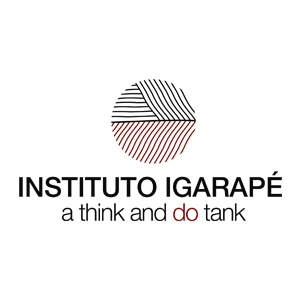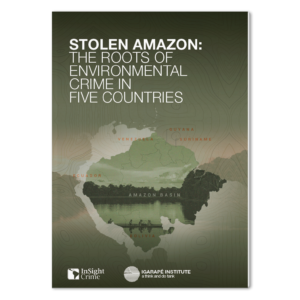Stolen Amazon: a new study from Igarapé Institute and InSight Crime uncovers the Roots of Environmental Crime in Ecuador, Venezuela, Bolivia, Guyana and Suriname
Exhaustive field research from Ecuador, Venezuela, Bolivia, Guyana and Suriname highlights the ways in which criminal actors and networks are contributing to illegal deforestation and environmental degradation
Because illegal deforestation does not respect borders, InSight Crime and the Igarapé Institute have launched an investigation into environmental crimes across five Amazonian countries: Ecuador, Venezuela, Bolivia, Guyana, and Suriname. With land in these five countries accounting for some 20 percent of the Amazon Basin, they have collectively lost 10 million hectares of forest over the last two decades – an area equivalent to that of Portugal.
“Stolen Amazon: the roots of environmental crime in five countries” is the third in a series of joint investigations by InSight Crime and the Igarapé Institute to highlight how environmental crimes harm natural ecosystems and communities in the Amazon basin. The analysis is complemented by a data visualization developed by the Igarapé Institute: EcoCrime Data.
In Bolivia, a rise in slash-and-burn land clearance has stoked forest fires that have consumed large tracts. The man-made infernos are often sparked by settlers who illegally raze trees to grow soy and raise livestock. Much of the deforestation benefits big agribusiness with ties to the government, the investigation found.
Similarly, tens of thousands of hectares of Ecuador’s Amazon have been invaded to sow palm oil. Valuable hardwoods and balsa, used in blades for wind-power turbines, are also being pilfered by timber traffickers to feed demand in China.
In the heart of Venezuela’s Amazon, rivers and forests are being contaminated with mercury from illegal gold extraction managed by criminal gangs and Colombian armed groups. Our investigation maps these groups, which include the Venezuelan gang the El Peru Syndicate, dissidents of the Revolutionary Armed Forces of Colombia (FARC), and units of Colombia’s Marxist rebel force the National Liberation Army (ELN). Much of the gold ultimately winds up in the vaults of Venezuela’s central bank, to be sold to prop up the struggling President Nicolás Maduro.
Millions of dollars’ worth of illegal Venezuelan gold is also spirited to neighboring Amazonian nation Guyana, where it is added to this nation’s production, which is also damaging to the forests. Guyana has less than a dozen inspectors for more than 9,000 mining sites. Abuses are rampant. Neighboring Suriname also serves as a laundering hub for illegal gold from Venezuela, Guyana and French Guiana that is disguised among its predatory gold production.
Wildlife traffickers, too, have their claws in these countries. Across Guyana, Bolivia, and Suriname, jaguars are killed and processed into a paste that is prized in Asian countries. Parrots and songbirds are trapped and sold in international markets for thousands of dollars.
These illicit trades cut across borders. Our investigation explores how these Amazonian countries often respond in isolation, allowing criminals to exploit the gaps in enforcement and legislation.
The cost of this mass deforestation is already being felt. Some parts of the Amazon have tipped from a carbon sink to carbon emitter. But all is not lost. Our report also offers opportunities for intervention, including possibilities for cross-border collaboration. Endemic corruption, however, must be addressed.
“Stolen Amazon: the roots of environmental crime in five countries” shows that collective action on the local, national, regional, and even global levels is essential and possible. The study points to a number of solutions to the challenges of environmental crime, including an integrated approach involving law enforcement institutions, environmental regulatory authorities, non-profit organizations, and especially local communities. Cooperation is critical to target the illegal actors at the highest levels who profit from Amazon’s destruction. A narrow approach based on intelligence and law enforcement alone is insufficient.
To access the entire investigation, click here.
Press contact: press@igarape.org.br / mramirez@insightcrime.org
About Igarapé Institute:
The Igarapé Institute is a leading independent think and do tank focused on public, climate and digital security. The Institute is committed to proposing data-driven and evidence-informed solutions and strategic partnerships to deliver progressive change. The organization drives positive transformation through applied research, the design of new technologies and proactive communication to shape public policy and influence decision-makers . The Institute works with governments, the private sector and civil society to design data-based solutions. Prospect Magazine designated the Institute the world’s best Human Rights NGO in 2018 and the top think tank working on social policy in 2019.The Institute has also been cited as among the top NGOs in Brazil for several years.
Learn more about the Igarapé Institute’s climate security program go to: https://igarape.org.br/climate-security/
About InSight Crime (insightcrime.org):
InSight Crime is a nonprofit organization dedicated to the study of the principal threat to national and citizen security in Latin America and the Caribbean: organized crime. For a decade, InSight Crime has crossed borders and institutions – as an amalgam of journalism outlet, think tank and academic resource – to deepen the debate and inform on organized crime in the Americas. On-the-ground reporting, careful research and impactful investigations are hallmarks of the organization. To learn more about InSight Crime’s in-depth coverage of environmental crimes, please visit: https://insightcrime.org/indepth/environmental-crime/
Read the publication




